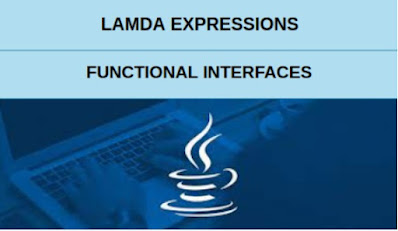Implement functional interfaces using lambda expressions

Java is Object Oriented Programming language , being object-oriented is not bad, but it brings a lot of verbosity to the program. Java 8 introduced new libraries and programming styles, for example, functional interfaces , lambda expressions , and streams . These bring functional-style programming to the object-oriented programming capabilities of Java. Java Functional Interface and Lambda Expression help us in writing smaller and cleaner code by removing a lot of boilerplate code. Java Functional Interface: A functional interface in Java is an interface that contains only a single abstract method. A functional interface can contain default and static methods which do have an implementation, in addition to the single unimplemented method. Here is a Java functional interface examples: Example 1, The below counts as a functional interface in Java because it only contains a single method, and that method has no implementation: public interface Addition { public Integer calcula